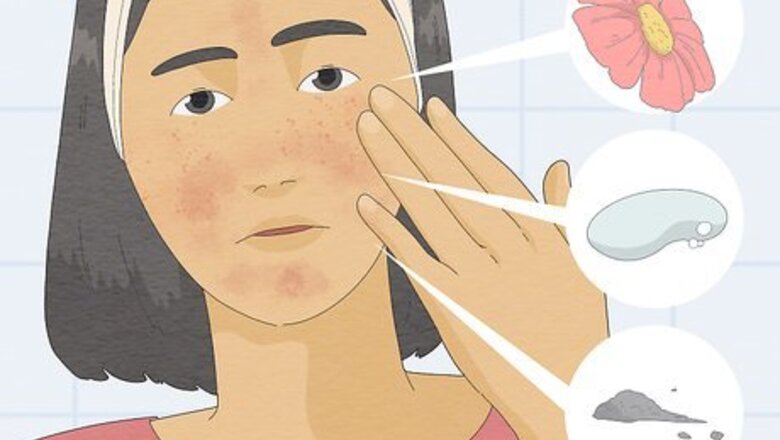
views
Here are 15 dermatologist-backed ways to treat eczema on your face.
Avoid environmental conditions that worsen your eczema.
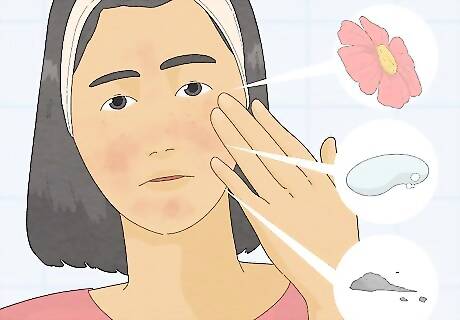
Pay attention to the things you're exposed to just before an eczema flareup. If you notice a pattern, try to avoid those triggers as much as possible. Keeping a journal or log might help, since it can be difficult to continually remember everything you were potentially exposed to. Soaps, detergents, dust, pollen, sweat, and stress are common triggers. If you're allergic to something, the allergic reaction might also trigger an eczema flareup. Eczema flareups in infants and children are sometimes triggered by eating certain foods, particularly eggs, milk, soy, and wheat.
Wash your face with a mild cleanser twice a day.
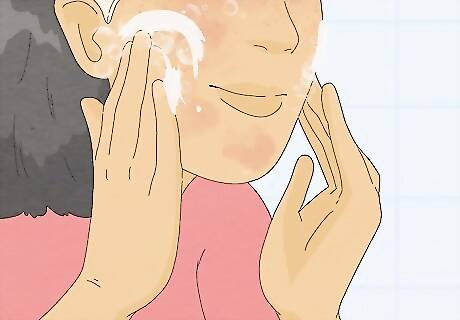
Choose a cleanser that's free of fragrances and dyes. Use lukewarm water to gently wash your face and avoid scrubbing it with a washcloth or sponge. Lightly pat your skin dry, leaving it slightly damp. In the US, look for a cleanser with the NEA (National Eczema Association) Seal of Acceptance. These products have been tested and are safe for eczema-prone skin.
Apply a thick layer of moisturizer after washing.
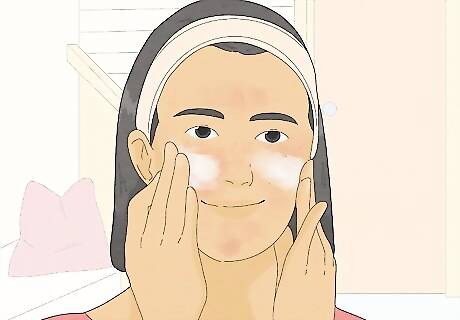
Use a moisturizer without fragrances or dyes that's formulated for sensitive skin. Some moisturizers will also have a label indicating they've been approved for eczema-prone skin. Moisturize liberally and allow it to soak into your skin for a few minutes. If you do this within 3 minutes of washing your face, you reduce the amount of moisture lost from your skin. Used this way, the moisturizer acts as a seal to trap the moisture in your skin and help heal it. If your skin still feels dry after the moisturizer has soaked in, go ahead and apply some more! When you're dealing with a flareup, you can never have too much moisturizer. If you've been prescribed a topical medication, apply it before you moisturize and allow it to completely soak into your skin.
Try natural oils for additional moisturizing.
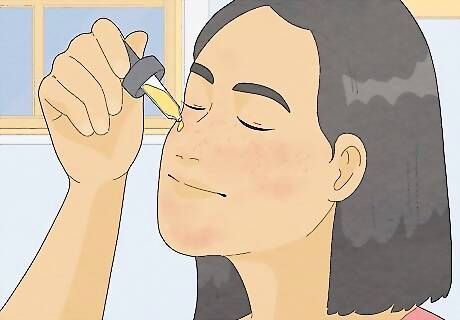
Massage natural oils into your skin after your moisturizer or at night. When you have eczema, your skin's natural barrier is defective—but natural oils can help strengthen it, easing your eczema symptoms and helping prevent flareups. This treatment works really well before bed, so the oil has all night to soak into your skin. Use cold-pressed ("virgin") oil that has been produced without using additional chemicals or heat. Coconut oil has proven to be helpful for eczema and sunflower oil can reduce inflammation during a flareup. Jojoba oil and borage seed oil have also been studied and found safe for use as a moisturizer if you have eczema. Not all natural oils are beneficial for eczema. For example, tea tree oil is readily available as a treatment for skin conditions, but it can worsen eczema.
Install humidifiers in your home to increase moisture.
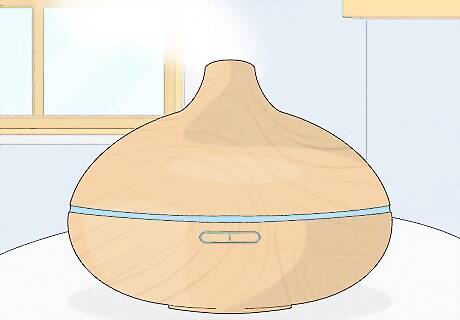
Dry home air can exacerbate eczema but a humidifier can help. This is a particular issue during cold weather when you're running the heat (which dries out the air). Small humidifiers that are designed for a single room are relatively inexpensive and might help reduce the severity of your eczema. You can invest in large humidifier systems that treat the air in your entire home, but if that's not in your budget, at least go for a humidifier in your bedroom. Have it running while you sleep to ensure your skin doesn't dry out excessively.
Try meditation to lower your stress levels.
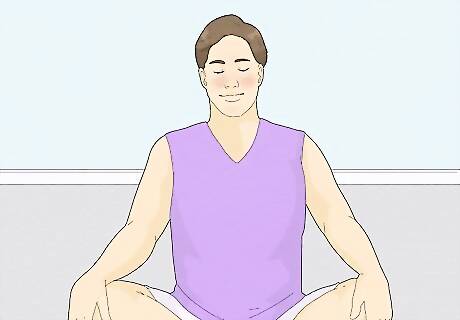
Stress is a huge eczema trigger and can cause flareups at the worst possible time. Meditation can help you cultivate a sense of inner calm and help you better handle life pressure. While it might not make a big difference right away, if you get in the habit, you'll notice that over time stress affects you far less. Tai chi and yoga are other practices that promote calmness and can reduce stress. If these practices interest you, check with your local community center to find out if there's a class you can join.
Take vitamins to boost your immune system.
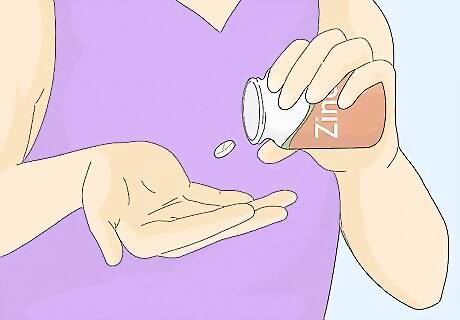
Ask your doctor about nutritional supplements that might help your condition. If you're not already taking a multi-vitamin, go ahead and do that to make sure you're getting the vitamins and minerals your body needs to function. In addition, the following vitamins and supplements can help with the management of eczema: Vitamin D Fish oil Zinc Melatonin Turmeric CBD
Use antihistamines to calm an allergic response.
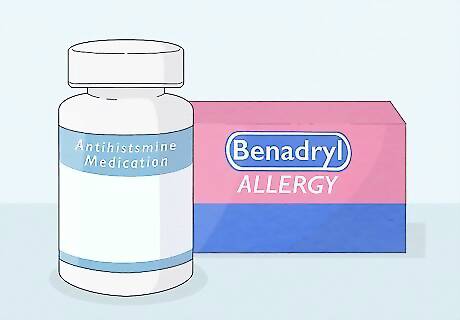
Antihistamines help fight the most irritating aspect of a flareup—the constant itching. Buy an over-the-counter antihistamine online or at your local pharmacy and give it a try. These drugs are particularly helpful if your eczema is related to an allergic reaction. Follow the instructions on the antihistamine package unless your doctor tells you otherwise. Tell your doctor you're taking an antihistamine, especially if they've prescribed medication. You want to avoid interference or unpleasant side effects.
Try over-the-counter hydrocortisone cream for itching.
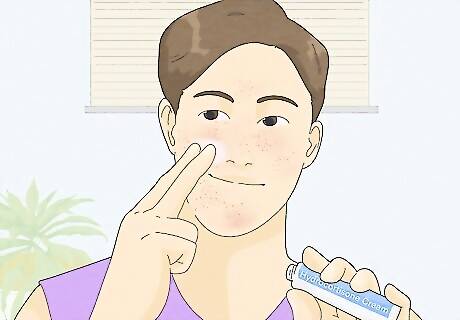
Creams tend to work better for eczema than ointments or lotions. You can buy these products under various brand names online, at your local pharmacy, or wherever over-the-counter first aid products are sold. Follow the instructions on the package regarding the amount and frequency of application. If over-the-counter creams don't work for you, talk to your doctor. They might prescribe a stronger steroid cream that you find more beneficial.
Consume probiotics to reduce the severity of flareups.
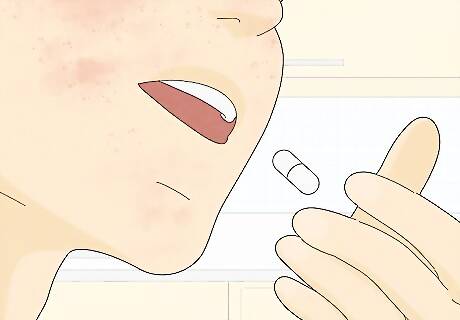
Research has shown probiotics can ease the symptoms of eczema. Probiotics may also reduce the need to use topical steroids, although their effects in treating eczema are still being studied. As of 2021, researchers still haven't determined an ideal dose of probiotics to combat eczema, but studies are ongoing. Choose a probiotic supplement that also includes prebiotics. These are the sugars bacteria use for fuel. Probiotics in combination with prebiotics have been shown to work better for eczema.
Go to a licensed acupressure or massage therapist.
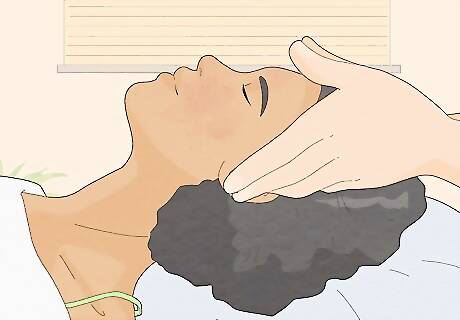
Acupressure can relieve itch and help your skin heal. You've probably heard of acupuncture, and acupressure is similar. Instead of using needles, physical pressure is applied to specific stress points. Scientific studies have shown that both acupressure and massage can benefit eczema. Massage also lowers stress, which in turn helps combat eczema flareups. If you're getting a massage, make sure the oils or creams your massage therapist uses are eczema-friendly. When in doubt, you can always bring your own oils or creams for them to use.
Talk to your doctor about wet wrap therapy.
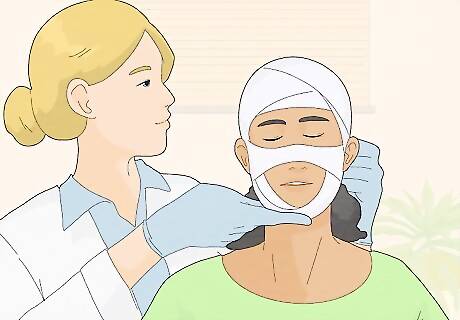
Special gauze is soaked in water and applied directly to your skin. You can usually do wet wrap therapy at home after your doctor teaches you how to do it. Your face, though, requires a particular type of medical gauze and is normally applied by a medical professional. Wet wrap therapy is particularly effective if you have a flareup that causes you severe itching and pain.
Try phototherapy for frequent flareups.
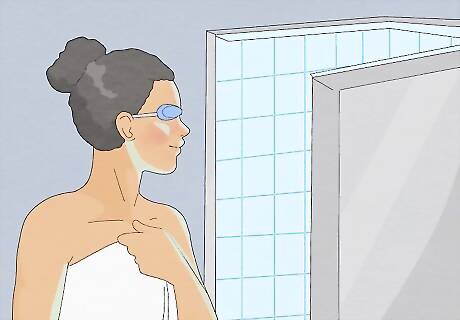
Phototherapy uses a special machine to emit light directly onto your skin. This type of therapy takes place in a doctor's office and is typically recommended for widespread eczema. If you only have eczema on your face, your doctor will be less likely to suggest phototherapy, but if you have frequent flareups and think it might benefit you, it doesn't hurt to ask. Phototherapy is usually most beneficial if you have flareups that aren't responding to creams and other topical treatments. Your doctor might want to exhaust other options before going this route.
Take biologics as a preventive measure.
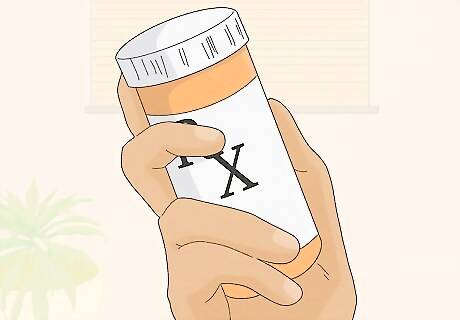
These prescription medications calm your immune system. An eczema flareup is typically the result of an overactive immune system that overreacts to some trigger, leading to inflammation. Biologics disrupt this process so you'll have less severe inflammation and fewer eczema symptoms. Doctors typically prescribe biologics if you have frequent flareups that don't respond well to other treatments. Biologics are preventive drugs that you have to take all the time. Rather than specifically treating flareups, they're designed to decrease the number of flareups you have and lessen the severity of flareups when they do happen.
Ask your doctor if immunosuppressants will help your itching.
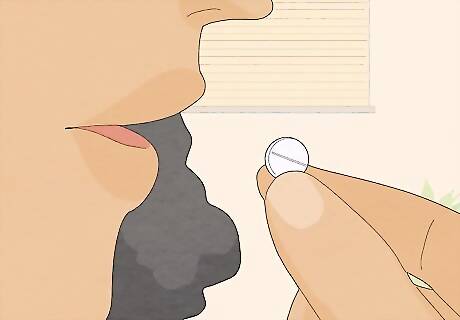
Immunosuppressants might help if you get caught in the "itch-scratch" cycle. You'll only take this drug temporarily during flareups, but it can reduce the severity of your symptoms and allow your skin to heal. Because it reduces itching, you'll scratch less, which also reduces your risk of infection. In the US, doctors' use of immunosuppressants to treat eczema is "off-label," meaning that these drugs haven't been approved by the FDA to treat eczema. Talk to your doctor about the potentially serious side effects, including the risk of kidney and liver damage.




















Comments
0 comment